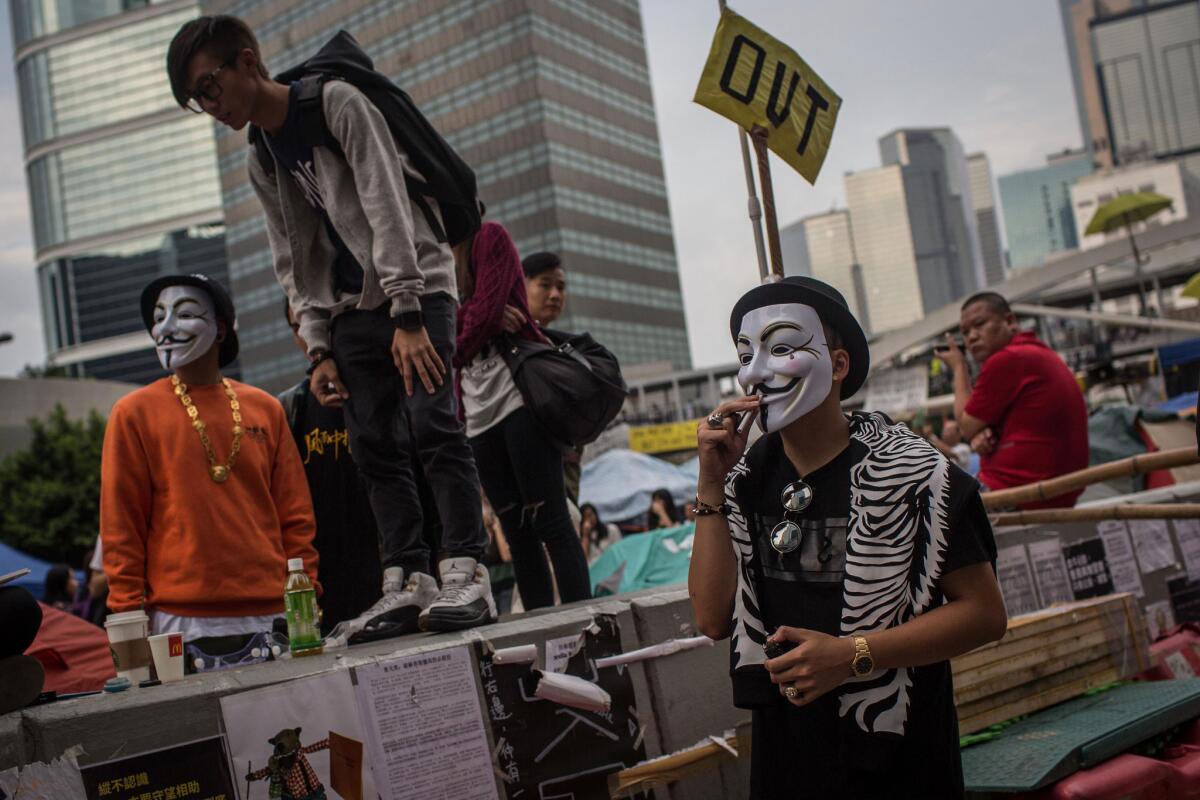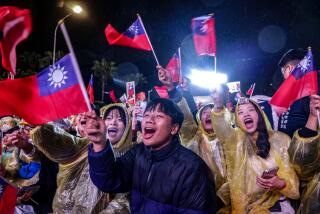Hong Kong protest leaders to poll followers about officials’ offer

- Share via
Reporting from Hong Kong — Hong Kong democracy protest leaders were organizing for an electronic vote Sunday to gauge protesters’ opinions about the government’s recent olive branch. But some supporters of the sit-ins warned the poll could backfire.
After more than three weeks of sit-ins, student protest leaders and government representatives held a two-hour dialogue on Tuesday. During the talks, student leaders emphasized their demand for open nominations for the 2017 election of the territory’s chief executive.
Government officials, however, reiterated that they were standing behind an Aug. 31 decision by the standing committee of China’s National People’s Congress laying out the framework for the 2017 vote. The panel mandated that candidates be pre-screened by a special committee -- which is widely expected to be stacked with pro-establishment members.
Hong Kong, a former British territory, was returned to Chinese rule in 1997 under a framework known as “one country, two systems” and was promised a high degree of autonomy from China’s Communist rulers for 50 years.
Benny Tai, a founder of the protest group Occupy Central with Peace and Love, said the vote allows demonstrators to express their views about the government proposals.
The poll is being coordinated by Tai’s group as well as organizations including the Hong Kong Federation of Students and Scholarism, two key protest groups
The exact wording of the poll has gone through multiple iterations. As of Saturday, organizers said it would focus on two main questions – but will not ask people whether or when they believe the sit-ins should end.
The first question concerns the government’s offer to submit a report to the Hong Kong and Macau Affairs Office of the State Council, China’s cabinet. Protesters will be asked whether this report must “include a suggestion that the standing Committee of the National People’s Congress withdraw its Aug. 31 decision.”
The second question will ask protesters their opinion about rules for the 2016 balloting for the territory’s Legislative Council and about how candidates should be nominated for the 2017 chief executive election.
The poll will be conducted in all three occupied areas – the Admiralty, Mong Kok and Causeway Bay districts. Voters must physically be present and will vote on mobile devices such as smartphones. Each voter must log in with an ID card number and telephone number to prevent multiple voting. There is no age minimum to vote.
Nevertheless, several pro-democracy activists have warned that the vote is too vague and will not unify protesters. Instead, they said, it could turn some of them away.
Wong Yeung-Tat, founder of the local political party Civic Passion, said the group – which is known for its strong anti-Communist stance -- will not actively participate in the vote.
“I believe their wish is to unify more protesters, but it is not the right way,” said Wong. “It might actually leave protesters divided.”
Many protesters in the working-class Mong Kok district, he noted, had already rejected the idea.
“The vote will ask people whether they are satisfied with the government’s proposals,” he added. “If the answer is yes, does that mean we should end the sit-ins? It is just so confusing.”
Tai said the vote has nothing to do with whether the protesters should leave the occupied areas. “We are hoping to get a stronger endorsement from the people through the poll,” he said.
Representatives of the Hong Kong Federation of Students and the territory’s government are supposed to meet for a second round of dialogue, though no date has been set.
Experts have also expressed concerns about the open vote, saying it could leave little room for future dialogue with the government.
Horace Chin, a local academic who advocates that Hong Kong become a sovereign city-state a la Singapore, called the vote “silly.”
“If you want to hear what the people want, [this kind of] vote is not the right way. How big of a turnout is good enough to represent the public?” asked Chin, an assistant professor in the Chinese department at Hong Kong’s Lingnan University. “How do you prevent people who want the movement to fail from messing up the result? And let’s don’t forget those who can’t make it to cast their vote, what about them?”
Chin said he believed the Federation of Students’ insistence on open nominations for chief executive “would never be a success.” Instead, he urged, protest leaders should focus on “democratizing” the nominating committee that Beijing wants to pre-screen the candidates.
Chin said he is planning to set up a new group to represent those people who disagree with the student groups’ way of leading the protests.
Meanwhile, Federation of Students leader Alex Chow has proposed that pro-democracy lawmakers in the Hong Kong legislature resign in order to prompt a by-election.
If the legislators are reelected, Chow said, that would be regarded as a signal of public support for what he called “genuine” political reform. Several lawmakers have expressed their willingness to resign, but it was unclear Saturday whether the protesters could muster enough resignations to trigger a new election.
Special correspondent Hui reported from Hong Kong and Times staff writer Makinen from Beijing.
Follow @JulieMakLAT for news out of Asia
More to Read
Sign up for Essential California
The most important California stories and recommendations in your inbox every morning.
You may occasionally receive promotional content from the Los Angeles Times.











